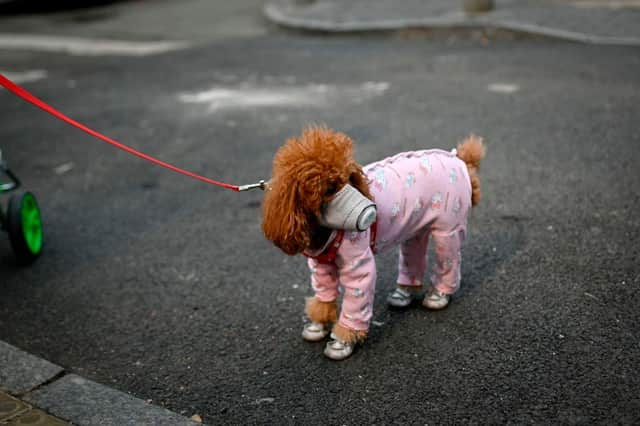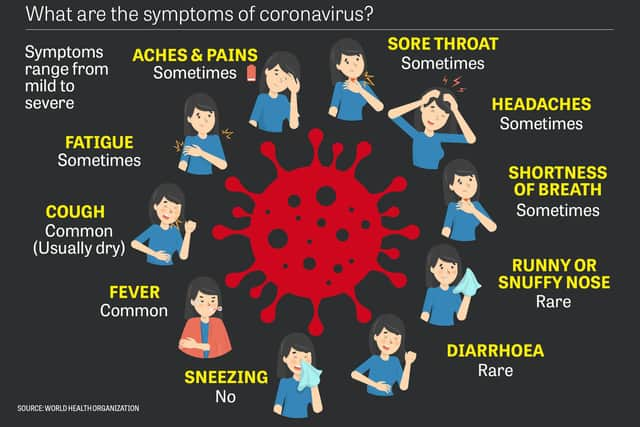Can dogs and cats carry coronavirus? And if pets can catch Covid-19 and get ill from the virus
This article contains affiliate links. We may earn a small commission on items purchased through this article, but that does not affect our editorial judgement.


Can animals even contract the new strain of coronavirus? Is it possible that they can pass it on to their human owners? Can they get ill from the virus?
This is what you need to know about coronavirus and pets.
Can animals get COVID-19?


The World Health Organisation (WHO) states: “At present, there is no evidence that companion animals/pets such as dogs or cats can be infected with the new coronavirus.”
Advertisement
Hide AdAdvertisement
Hide AdHowever, the statement goes on to advise pet owners to maintain good hygiene, like washing their hands with soap and water after contact with their pets.
“This protects you against various common bacteria such as E.coli and Salmonella that can pass between pets and humans,” WHO said.
The PSDA also states: “Current advice from the World Health Organisation and British Veterinary Association is that there’s no evidence that pets can be a source of infection or that they can become sick from COVID-19.”
Are there any known cases of coronavirus in pets?
The Hong Kong authorities issued a statement to advise people against kissing their pets after a dog repeatedly tested “weak positive” for the virus.
A spokesperson for the Agricultural, Fisheries and Conservation Department (AFCD) said: “A pet dog had been tested weak positive to COVID-19 virus.”
The AFCD said that oral, nasal and rectal samples were collected from the dog for testing for the virus, and that the nasal and oral samples had tested a “weak positive” for the virus.
While the dog’s owner was infected with COVID-19, the AFCD said: “The dog does not have any relevant symptoms.”
Despite the “weak positive” this dog tested for, the announcement from the AFCD said: “At present, the AFCD does not have evidence that pet animals can be infected with COVID-19 virus or can be a source of infection to people.”
Advertisement
Hide AdAdvertisement
Hide AdThe department said that, to ensure public and animal health, that “mammalian pets of patients confirmed to have been infected with COVID-19 virus to be put under quarantine by the AFCD”.
The dog was first tested on 26 February, where it showed low levels of the virus. Tests were then repeated on 28 February and 2 March, also returning “weak positive” results.
The dog was released from mandatory quarantine when it returned a negative test – however the 17 year old Pomeranian passed away a few days later. The owner declined an autopsy, and animal welfare authorities said that it’s possible that the dog died from stress and anxiety relating to quarantine. On average, Pomeranian’s also only live for between 12 and 16 years.
A cat in Belgium recently became the first human-to-cat transmission of the virus, and it successfully recovered after nine days.
Are animals contagious?
The Society for the Protection of Animals (SPCA) in Hong Kong said that an animal infected with coronavirus isn’t necessarily infectious to humans.
The SPCA said in response to the news of the dog with the virus: “While the information tells us that the dog has a low level of infection, members of the public should note that the dog is showing no symptoms whatsoever.
“We have been informed the dog is currently very healthy and doing well at the quarantine centre.
“As the AFCD said, it is very likely to be a case of human-to-animal transmission. The SPCA advises pet owners to exercise stringent personal hygiene.
Advertisement
Hide AdAdvertisement
Hide Ad“If an owner is suspicious of being infected with the virus, he/she shall consider limiting his/her contact with their pet animals.”
Can animals spread coronavirus?
The Centre for Disease Control and Prevention (CDC) states: “At this time, there is no evidence that companion animals including pets can spread COVID-19.”
Regarding animals recently imported from China, the CDC said: “As with any animal introduced to a new environment, animals recently imported from China should be observed daily for signs of illness.
“If an animal becomes ill, the animal should be examined by a veterinarian. Call your local veterinary clinic before bringing the animal into the clinic and let them know that the animal was recently in China.”
Similarly, the World Organisation for Animal Health says that the “predominant route or transmission of COVID-19 appears to be from human to human”.